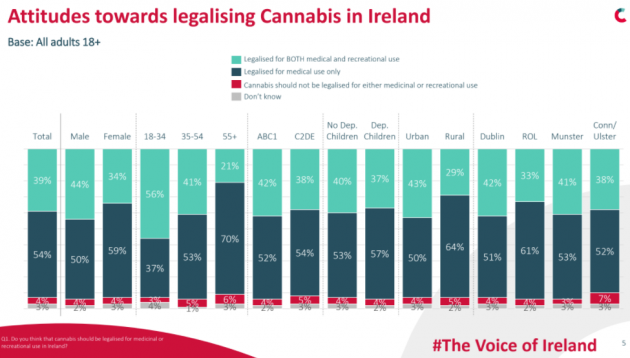WeedLife News Network
Ireland: Almost 40% favour legalising cannabis for recreational use, over 90% in favour of medicinal use

ALMOST 40% OF Irish people believe cannabis should be legalised for recreational use and there is an overwhelming support for the medical use of cannabis.
New polling by Red C on behalf of The Journal shines a light on the nation’s views on legalising cannabis, with only 4% of people opposed to the medical use of cannabis.
At present, the use of four cannabis-based products is allowed in Ireland in strict circumstances and under a pilot scheme.
There is near uniformity across different age groups in believing that medical use should be legal, but opinions vary on whether recreational use of cannabis should be permitted.
A majority (56%) of 18-34 year olds believe that cannabis should be legalised for both medical and recreational use while this drops to just 21% for those aged over 55.
Among that age cohort there is still a large majority for medical use only at 70%, meaning that 91% of those aged over 55 feel that cannabis should be legal for medical reasons.
There is not much regional variation across the provinces, but in Connacht/Ulster 7% of people do not feel any legalisation should take place, a small but noteworthy increase on the national average of 4%.
Men are also more likely to be in favour of legalisation for recreational use, with 44% in favour of it compared to 34% of women.
There is also an urban/rural disparity with 43% in urban areas in favour of recreational use and 29% in rural area.
The fieldwork was carried out between 6-12 May, a number of days after the College of Psychiatrists of Ireland (CPsychI) warned that cannabis represents the “gravest threat to the mental health of young people in Ireland today”.
Much of the focus of the group’s concern was due to the increasing potency of the illegal cannabis on sale across Europe, with previous analysis finding that potency had doubled over the period 2006 to 2016.
Overall, the Red C research suggests that there is support for a move towards some form of greater legalisation, with 93% of people surveyed in favour of the medical use of cannabis.

In Ireland, legalising cannabis for medical use has hit a number of roads blocks in recent years and legislation has failed to get enough support in the Oireachtas.
In 2019, cannabis-based products were made available for medical use through the Medical Cannabis Access Programme.
The five-year pilot programme currently allows listed products be made available to a patient when a consultant determines that they have not responded to standard treatments.
Minister for Health Stephen Donnelly told the Dáil earlier this year that 2021 funding for this programme had been secured and subsequently said that commencement this year is likely in June.
Currently four cannabis-based products have been assessed as acceptable for use by the Health Products Regulatory Authority (HPRA).
The programme is only available to patients with a number of conditions including spasticity associated with multiple sclerosis, nausea associated with chemotherapy and treatment-resistant epilepsy.
The Medical Cannabis Access Programme is not available for people with chronic pain, with the Minister for Health previously questioned in the Dáil about whether such conditions should also have access.
The HPRA has previously said that, while the use of cannabis for chronic pain “is acknowledged”, there are “diverse” causes of such pain and “subjective factors” that make difficult for a doctor to assess treatment.
In its 2017 scientific review of Cannabis for Medical Use, the HPRA also said the use of cannabis for chronic pain could lead to greater misuse of cannabis in the wider community.
“Chronic pain is common and the potential use of cannabis-based medicines by a large number of patients raises concerns about misuse and diversion into the wider community,” the HPRA says.
Copyright
© 420 Intel
When you subscribe to the blog, we will send you an e-mail when there are new updates on the site so you wouldn't miss them.

